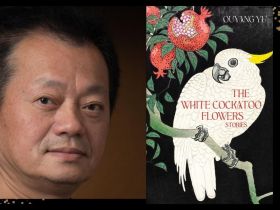Janet Malcolm’s Nobody’s Looking at You: Essays published by Text Publishing.
The Guardian refers to Malcolm as ‘a ruthless, dazzling journalist’. But though there can be no dispute about the adjectives in that assessment, and while she uses journalistic techniques to acquire her information, Malcolm writes more like a very accomplished novelist than most journalists.
The essays in this collection were published between 1996 and 2018 but are not presented in chronological order. Instead, the book is divided into three parts, the first of which has five essays that focus on specific individuals. Part II has four pieces that explore notable events. In Part III we find nine excellent works that focus on a variety of literary subjects. What is sadly missing is an introductory piece that comments on the selection process of these particular essays from a rich and plentiful body of work.
Reading one of Malcolm’s essays is more like reading a short story than a newspaper article. The narrative has pace and the reader feels they are on track to finding out more about the people being interviewed, if the essay is about an individual, or about what happens next, if the essay is about an event. The essays about literature share in these qualities because they deal critically with the writers mentioned and their work, and how that work is, or should have been, perceived. Throughout all Malcolm’s writing, her perspicacity shines through, and her disarmingly simple style has remained surprisingly constant in each of these essays, even though the selection spans 22 years.
One of the essays that focuses on people is called ‘Three Sisters’. It is the story of the Argosy Book Store, which is still a thriving business in New York. Malcolm spent many hours observing the workings of the store and getting to know the three sisters who run it harmoniously. She tells a heart-warming story of success and cooperation spanning generations. When there is a brief moment of disagreement between the sisters, Malcolm reports, ‘The invisible cord that binds siblings together is wrapped in an insulation of asperity. Sisters, perhaps more than brothers, unendingly irritate one another and scrap with one another.’ Here, as in all she writes, Malcolm leaves no doubt about her opinion. Reading her essays, one has the feeling that her opinions are worth listening to and may well be correct. They are certainly persuasive.
‘Special Needs’ is one of the essays describing events. In this case, the events are those covered by the nine-part documentary series, ‘Sarah Palin’s Alaska’. Malcolm uses this review to make a strong political point. She recounts sympathetically the problems and disappointments Palin faced when giving birth to a child with Down’s syndrome. That birth prompted Palin to say, ‘Every child is beautiful before God and dear to Him for their own sake. And the truest measure of any society is how it treats those that are most vulnerable.’ Here Malcolm pounces on the phrase about the most vulnerable and makes the point that, ‘Conservative politicians rarely even mention poor people – and then only to tell them to pull up their socks.’ This essay was published in The New York Review of Books in 2011 to express a political opinion against a politician then on the comeback trail.
The essay called ‘Socks’ is an outstanding literary tour de force. Here, Malcolm enters the debate about the quality of the translation of Anna Karenina from Russian to English. She reminds us that educated Russians, like Tolstoy, knew English and were reading Dickens and Trollope but that ‘few educated English speakers have read the Russian classics in the original’ and she explains why this is relevant. Malcolm bemoans the fact that translators Richard Peaver and Larissa Volokhonsky ‘have established an industry of taking everything they can get their hands on written in Russian and putting it into flat, awkward English.’ Even worse, another translator inserts the words ‘instead of socks’, supposedly to help the English reader, although the original makes no reference to such footwear. Malcolm makes it abundantly clear that if you accept this sort of unwanted intrusion, you are beyond the pale when it comes to which translation of Anna Karenina you find acceptable. Perhaps her passion about the quality of translations stems from the fact she is bilingual – Malcolm still speaks her first language, Czech (though admits she has no Russian). In the process of commenting on various translations and translators, Malcolm quotes excerpts from Anna Karenina that have the effect of reminding you just how good that book is, or at least how good the Constance Garnett translation is – to the extent you will feel the urge to read it, or read it again.
Nobody’s Looking at You is a collection that reveals Malcolm as an incomparable raconteur; she has the ability to make any subject fascinating. Each of the essays grab the reader’s attention regardless of whether the subject matter is one of their particular interests. This ability, coupled with her outspoken but persuasive opinions, make her a writer of considerable influence – not only in America but throughout the English-speaking world.
Rating: 4 ½ stars ★★★★☆Nobody’s Looking at You: Essays
By Janet Malcolm
Text Publishing
Extent: 304pp
Format: Paperback
Text publication date: 19 February 2019
ISBN: 9781925773705
AU Price: $32.99
Categories:
Society & Culture
Essays
Non Fiction





